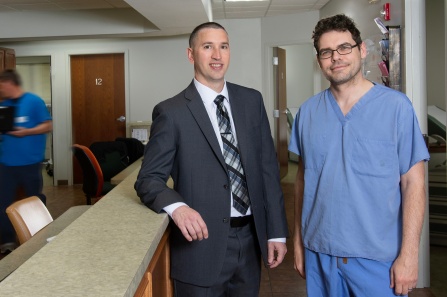
Robert W. Macek, MD, residency program director, left, with resident physician Charles Wilber, MD.
Choosing a Family Medicine Residency Program
If you’re looking for the support, opportunities and resources you need to develop as a family physician, choose a residency program with these seven attributes:
1. Tailored Training
Select a program with multiple training tracks. Each track should have its own family medicine center and inpatient service. That way, you can train in the setting that you see yourself practicing in after graduating, and care for the patient base you most want to serve.
If you envision yourself practicing internationally — or want to figure out if it would be a good fit for you — seek out a program with a dedicated concentration in global health.
To further individualize your training, identify programs where you can pursue your interests by choosing from a broad array of electives — and where you’re given ample time to explore them.
2. Comprehensive, Up-to-Date Curriculum
Some program administrators review their curriculum only when the ACGME releases new guidelines.
Instead, they should do it every year.
A thorough annual review assures that the curriculum continually evolves — that administrators are taking advantage of all the resources at their disposal to best prepare you to meet the challenges of the changing health care landscape.
The review should encompass all topics within the curriculum so you benefit from updated didactics for success in your training, on the boards and beyond.
3. Multiple Clinical Sites
A residency affiliated with numerous health care facilities enables you to develop flexible diagnostic strategies and adapt to a wide variety of professional settings.
In this training environment, program administrators select from specialty services across the region to give you the best training opportunities available.
You’ll treat a broad patient base, become familiar with different electronic medical record systems and learn a variety of protocols for delivery of care.
4. Dedicated Faculty
Make sure that faculty are primary health care leaders who are committed to your training and success.
In our family medicine residency, we have identified core faculty who work with small groups of residents to:
- provide oversight
- regularly evaluate each resident
- make sure that you reach all training milestones
In addition, our faculty enjoy significant protected teaching time.
5. Patient-Centered Medical Homes
You should train in a family medicine center that has been recognized by the National Committee for Quality Assurance as a patient-centered medical home.
This national seal of approval only goes to those family medicine centers that demonstrate a comprehensive, coordinated and compassionate approach to care.
Training in this environment puts you on the front line of primary care transformation. You’ll practice evidence-based, systems-based care that is both patient-driven and patient-centered, all the while forging the skills you need to be part of the future of family medicine.
6. Rich Research Program
Whichever program you select, the ACGME requires that you complete several scholarly projects.
Therefore, it’s critical that faculty in your program actively engage in primary care research and have a solid track record of mentorship and collaboration.
Our department is recognized for the caliber of our research and our prolific authorship — expertise that we gladly share with all of our residents.
7. Comfortable Living Environment
Residency is a demanding chapter in your career. Don’t compound your stress by choosing a program in an expensive, unfriendly city.
Instead, look to a city that promises you a high quality of life.
Can it boast affordable housing? Is it easy to get around?
Does if have wealth of cultural and recreational attractions? A thriving dining scene?
Whether you’ll be living with your family, a partner or alone, a region with a strong sense of community will make you feel at home from the moment you arrive.